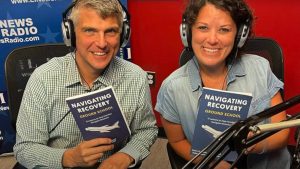
Two Successful Recovery Programs
There are two very successful programs with proven results for long-term recovery. They are the Human Intervention Motivation Study (HIMS) for pilots and Partial Hospitalization Program (PHP) for physicians. Amazingly, both programs boast an above an 80% success rate at long-term recovery. Other general programs, without a similar foundation, have a success rate of less than 20%.
These programs share a few things in common, including long-term care (up to 5 years) and structured planning. Often, people find these programs refreshing. HIMS and PHP programs begin with the assertion that they WILL be successful. So, the persons affirms that they WILL recover. Families can benefit from adopting this positive mindset. Hence, begin a shift from what have felt like a hopeless situation.
Further Insights into the Programs
The successful programs for pilots and doctors are based on Eight Essential Elements:
- Positive Rewards and Negative Consequences. The family sets a clear definition of what a successful recovery looks like. A reward system will be established when expectations are met. Consequences are in place in the chance that a loved one relapses.
- Frequent Random Drug Testing. Pilots and doctors in the PHP and HIMS program are required to undergo routine drug testing for 5 years. So in your case, a drug test can be a great deterrent for returning to use. And in the event of a relapse, it allows the family to respond quickly.
- 12-Step Programs and Abstinence Standards. 12 step programs measure success by abstinence.
- Viable Role Models and Recovery Mentors. In early recovery, it is important to for patients to have the support of peer groups. This is necessary to put in greater perspective what a successful recovery could look like. Thus, Recovery coaches and/or sponsors are also included in this.
- Modified Lifestyles. As recovery enhancing decisions are supported and encouraged, living situations, careers, and relationships will have to change. The family will support these transitions.
- Active and Sustained Monitoring. Third party monitoring of drug tests and compliance with a program allows families to step out of the “policing” role. Hence, the person of concern develops a trusting relationship with a team that can advocate for them. Correctly, relapses are addressed with love and treatment is consistently encouraged and reinforced as the primary goal.
- Active Managing of Relapse. Early detection of relapse is critical. When a relapse occurs, it is an opportunity for the family to re-evaluate the plan. They can take new information from the experience to reformulate a better strategy.
- Continuing Care Approach. Similar to diabetes or any other chronic illness, addiction is a disease that requires ongoing management. Ideally, a solid treatment plan considers the trajectory of the next 5 years.
Integrated Programs
Integrating all eight of these elements in a recovery program is the key to producing sustainable, long-term recovery. Now, most individuals don’t have access to the structured programs of pilots and doctors. So, families can step in and offer similar support and structure.
Addiction can take its toll on everyone in a family. It is common to see in-fighting, emotional withdrawal, grief, and secret-keeping. Often, it seems as if families have reached the point of accepting chaos within their lives. However, the reality is that they are functioning to the best of their ability while dealing with long-term addiction. They are not dysfunctional – they are in crisis.
Family Success
The success of our program is dependent on families agreeing support their loved one. When you stand by them, you are committing emotionally and physically for three months to even a year. Throughout this process, the family must continue to support their loved one. Throughout recovery, families learn how to support the needs of their loved one, combat the addiction, and re-stabilize relationships.
About Adam Banks
Adam Banks is a certified interventionist and the owner of Adam Banks Recovery. After receiving an MBA from the University of Chicago, Adam built a company acquired by United Health Care. His discipline and attention to detail comes from his former career as an airline pilot, holding an ATP, the FAA’s highest license.
Today, Adam is dedicated to helping others achieve long-term sobriety. His work has guided executives, pilots, and physicians on paths to recovery. Adam brings families together through a loving and inclusive approach.
Adam has authored four books on addiction. His recent work, Navigating Recovery Ground School: 12 Lessons to Help Families Navigate Recovery, educates families on the entire intervention process. He also offers a free video course for families considering an intervention for a loved one.
Adam is available for alcohol and drug intervention services in New York, Long Island, the Hamptons as well as nationally and internationally.




